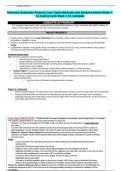Tentamen (uitwerkingen)
Summary Australian Property Law: Cases Materials and Analysis lecture Week 1- 12, tutorial work Week 1-12, complete
- Vak
- Instelling
CONCEPTS OF PROPERTY E.G. of property: things (goods), land, copyright (product of artistic/skilled endeavour), shares, contractual rights (debts), software, air, water, minerals, indigenous rights to hunt, fish, hold ceremonies, reside etc. • Property refers to a specific form of legal relati...
[Meer zien]





